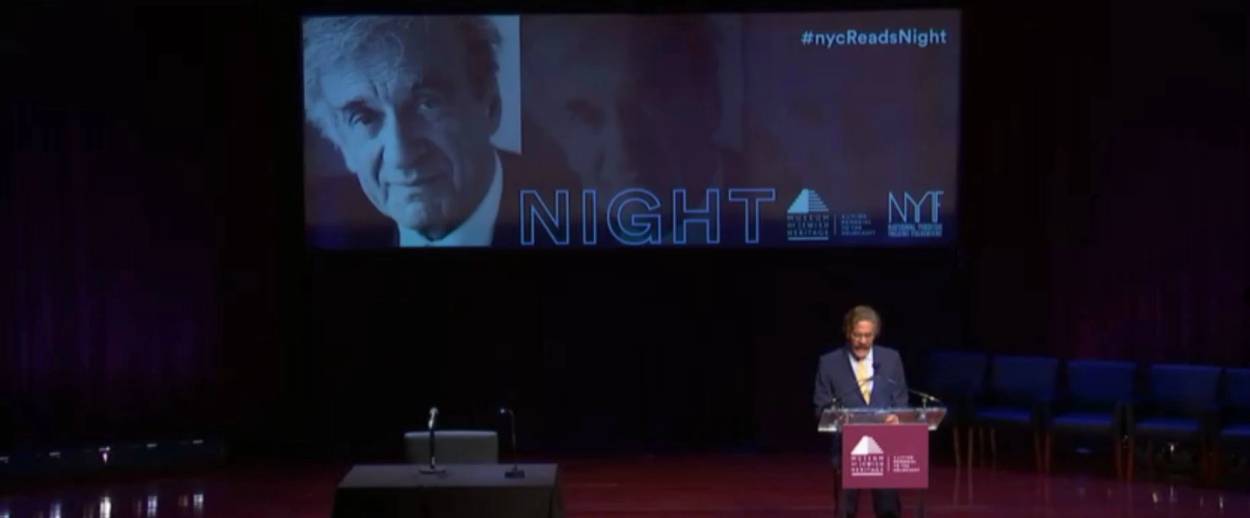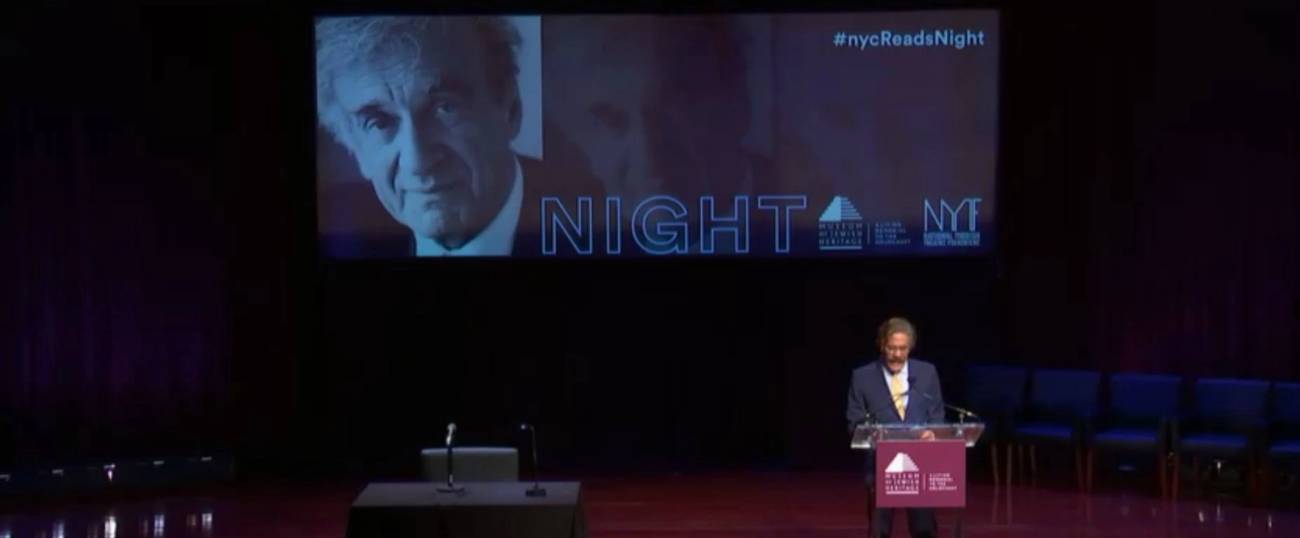“Those who kept silent yesterday will remain silent tomorrow.”
So wrote Elie Wiesel in his Holocaust novel, Night. And last Sunday evening, his words rang across a dimmed, crowded auditorium in lower Manhattan during a star-studded reading of Wiesel’s magnum opus. The five-hour public reading, which was also live-streamed online, was part of the Museum of Jewish Heritage’s tribute to Wiesel for International Holocaust Remembrance Day. (Wiesel was an honorary chairman of the board of the museum until his death last summer.) The date was also the 72nd anniversary of the death of Wiesel’s father, Shlomo, whose murder at Buchenwald is recounted in Night.
“The concept was to read Night all night,” said Abe Foxman, the former national director of the Anti-Defamation League and the director of The Center for the Study of Anti-Semitism at the museum, who dreamed up the concept for the event. “To pay tribute to someone by reading their words—there is no higher tribute.”
Among the readers were preeminent violinist Itzhak Perlman, actress Tovah Feldshuh, NYPD Commissioner James O’Neill, former New York Gov. Eliot Spitzer, and sex therapist Dr. Ruth Westheimer, a German-Jewish refugee who escaped via Kindertransport and whose parents died in the Holocaust.
The event, co-produced by the National Yiddish Theatre Folksbiene, began at 3 p.m. with opening remarks from Foxman, who spoke to a room of around 100 people, a number that multiplied as members of the public flowed in and out of the main auditorium until the reading concluded at 8 p.m. One by one, celebrities and dignitaries merely stepped on stage, read their portion of Night, and nothing else, then left the stage for the next person to pick the harrowing yet hopeful tale back up. The reading closed with actor Ron Rifkin.
Wiesel first published Night in its current form in French in 1958 and in English two years later. Throughout his life, Wiesel published most of his books first in French, with the exception of Night, which was printed in Yiddish by an Argentine publisher in 1952—a fact pointed out by Aaron Lansky, the founder of the Yiddish Book Center, who read his portion Yiddish. Wiesel’s autobiographical work about his survival as a teenager at Nazi death camps, and his experiences there with his father, was read in English its entirety, with the exception of Lansky, the who read in Yiddish the section where Wiesel questions God in the face of evil: “Where are you, my G-d?”
As the event proceeded, thousands of people gathered nearby in Battery Park to protest President Donald Trump’s controversial immigration ban—a confluence of events that Foxman said was fitting because Wiesel “stood up to prejudice, racism, and bigotry directed at anybody.”
Mary Boys, the dean of Union Theological Seminary, who also read a section of Night, said, “We have a president who didn’t see fit to mention Jews and the Holocaust,” referring the Trump administration’s decision to leave out specific mention of the Jews in its Holocaust Remembrance Day statement. Boys, who has been involved in Christian-Jewish relations for 30 years, expressed an imminent need for unity since “we’ve seen a resurgence of fear of the other.” She expressed the need for more intersectional work between those combating racism and anti-Semitism.
Israeli Consul General of Israel in New York Dani Dayan said, “We have a duty to remember the Shoah [as] a Jewish event.” Wiesel, too, viewed the Holocaust was a Jewish tragedy, adding that it is one “with universal implications.”
Also present to read were also the German Consul General to New York Brita Wagener and French Ambassador to the United Nations Francois Delattre. “I am here,” Delattre said, “because there’s nothing more important for everyone, and for me, and I think it’s my duty.” He continued: “What I know for sure is that anti-Semitism is our common enemy and it’s an existential threat to all of us—Jews and non Jews alike.”
Journalist Ann Curry, who has reported from conflict zones around the globe also read a portion of Night. She said the event and current political situation around the world, specifically dealing with refugees, has made her more “conscious of the rights of displaced and disenfranchised people.”
“There’s always a fear [of that happening] when people don’t stand up,” said Carmen Fariña, chancellor of the NYC Department of Education. “Night is a required book in all of [New York City public] schools. It’s important for all people to realize it’s not just a book; it really happened.” After describing having walked through the protests in Battery Park to get to the museum, Fariña adamantly said, “I don’t want to see history being repeated.”
In the gift shop, the museum had been mindful to order in more Wiesel books than usual, including his 1992 Haggadah. All of Wiesel’s titles were selling faster than normal.

